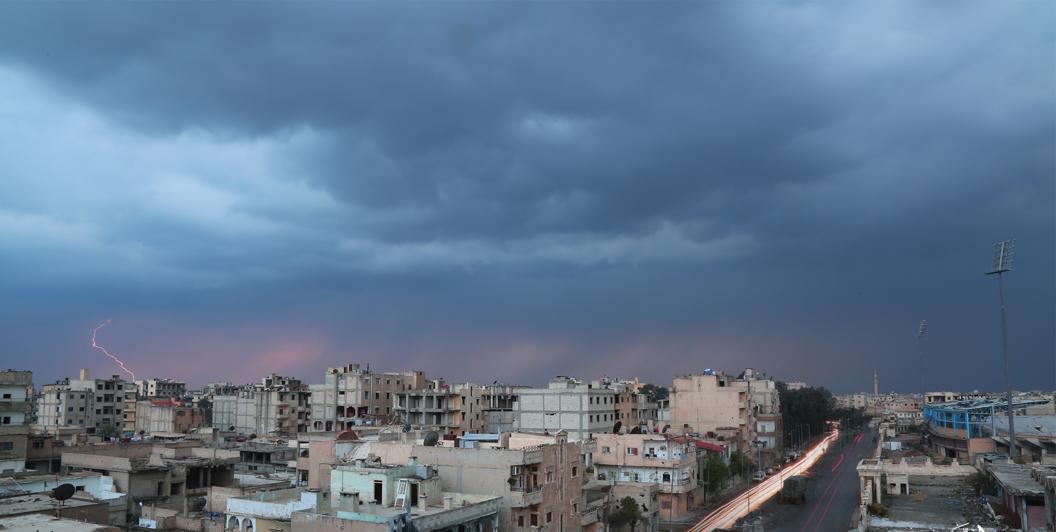
BEIRUT — Residents of the northern Syrian city of Raqqa live in terror, trapped as a massive human shield in the Islamic State’s de facto capital ahead of the final battle with US-backed opposition forces for the militant group’s last major urban stronghold.
A belt of land mines and militant checkpoints circle the city. Inside, all the men have been ordered to wear the jihadis’ garb of baggy pants and long shirts — making it difficult to distinguish Islamic State militants from civilians.
Hundreds if not thousands of Syrians who fled from other parts of the country now live in tents in Raqqa’s streets, vulnerable to both warplanes and ground fighting. Enormous tarps have been stretched for blocks in the city center to hide the militants’ movements from spy planes and satellites.
The estimated 300,000 people trapped inside live in terrifying uncertainty over how to find safety. Airstrikes by the US-led coalition shake the city almost daily, mainly hitting northern neighborhoods, amid reports of civilians killed by strikes in the nearby countryside.
Leaflets dropped by coalition warplanes give confusing directions — one suggests areas closer to the Euphrates River are safer, but then another warns that boats crossing the river will be struck.
Mass panic erupted on Sunday, when the Islamic State announced on mosque loudspeakers that US strikes had hit a dam to the west of Raqqa. Residents were urged to flee imminent flooding, and thousands did. The militants allowed them into Islamic State-controlled countryside nearby, as long as they left their possessions behind, according to an activist who is in touch with people inside the city. Hours later, the militants announced it was a false alarm and urged everyone to return.
‘‘The people really don’t know where to go,’’ said the activist, saying residents were caught between airstrikes, land mines, and Islamic State fighters mingling among civilians.
To get a picture of Raqqa, The Associated Press talked to more than a dozen people with knowledge of the city, including residents who were still there or who had recently escaped, and activists with organizations that track events through contacts inside, as well as diplomats, the US military, and aid groups. Almost all spoke on condition they not be identified, fearing for their own lives or the lives of their contacts.
Getting information is difficult. Militants constantly look for ‘‘spies.’’ One activist said two people had recently been put to death for suspected contact with the coalition. The only internet access is in a few approved cafes where patrons must give their names and addresses and endure spot checks by Islamic State fighters, who burst in and order everyone to raise their hands so computer screens can be inspected.
Raqqa, a provincial capital on the northern bank of the Euphrates, is the next major battle against the Islamic State group as Iraqi forces push to complete the recapture of northern Iraqi city of Mosul after nearly six months of fighting. For the Raqqa campaign, a multiethnic force of Syrian fighters, dominated by Kurds and supported by US special forces, artillery, and air power, have been maneuvering to isolate the city.
Concerns over civilian casualties have become a significant issue in the fight for Mosul. Amnesty International said Tuesday a significant spike in civilian casualties suggests the coalition is not taking enough precautions in its airstrikes. The US has said it is investigating the deaths, but American and Iraqi officials also suggested the militants blew up homes and blamed the coalition.
Battle-hardened Syrians and Iraqis are leading the defense in Raqqa, bolstered by reinforcements from those who withdrew from Mosul and other parts of Iraq. Dass said about 2,000 fighters and their families are en route from Iraq, and Ramadan said many are already in Raqqa. Rami Abdurrahman, head of the Syrian Observatory for Human Rights, estimated over 4,000 fighters in the city.
Getting smuggled out is too expensive for most of the trapped civilians. Smugglers — most often Islamic State fighters looking to make a profit — charge $300 to $500 a person and sometimes as high as $1,000 to get out of the city, according to several activists and a Western aid worker familiar with the situation.
Once outside, they face the danger of the land mines. The aid worker said one man who staggered into a camp for the displaced had lost a child from a roadside bomb and was himself gravely injured.
Those who make it to areas controlled by multiethnic force risk being turned back unless they have someone vouch for them, according to Muhab Nasser, an activist from Raqqa province. He said some had been refused entry by thsoe fighters, suspicious of Islamic State infiltrators or sympathizers.
The cost of being smuggled out of Syria entirely is a prohibitive $3,000 to $4,000 a person, according to Sarmad al-Jilane, a Sound and Picture activist in Turkey. Turkey also is cracking down on crossings.
As a result, few from Raqqa are found in southern Turkey, where hundreds of thousands of Syrians have fled the civil war. The aid worker also said so far there is no refugee crisis from Raqqa — a chilling sign of how hard it is to leave.



